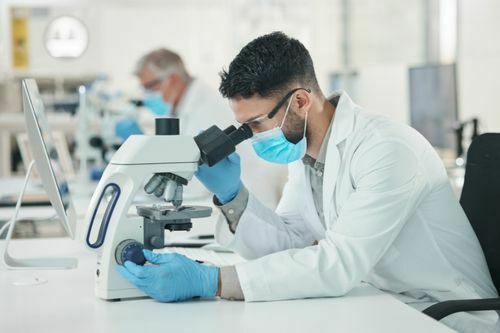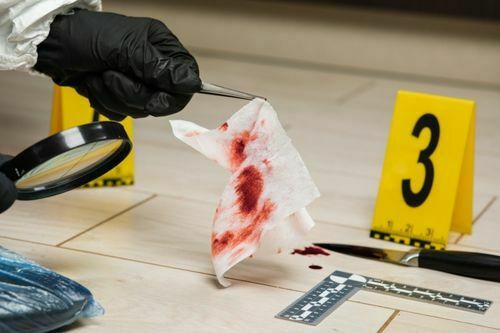Table of Contents
Forensic science is the use of scientific procedures and methodologies in a variety of legal and criminal contexts. Criminal prosecutions and investigations make the most frequent use of it. Through identification, testing, and evaluation, forensic science focuses primarily on locating physical evidence.
A career in forensic science
Forensic science uses a variety of scientific disciplines, such as chemistry, biology, and physics, to analyze and interpret data related to crimes. Applied forensic science includes gathering proof from criminal scenes, the analysis of criminal data, identifying the reason for crime, making theories about the crime, etc.
Some examples of popular careers in forensic science subjects are as follows.
Pathology

Pathologists have the option to exclusively focus on the field of medical forensics. These medical experts are in charge of performing autopsies on bodies to ascertain the cause of death. They might support the investigation of homicides and assess the results of autopsies.
Private investigation
In the interest of their customers, private investigators may look into both civil and criminal situations. On rare occasions, they may need the assistance of local law enforcement and forensic scientists.
Police officer
Police officers receive forensics training as well as the opportunity to work with qualified forensic specialists, particularly when they advance to more senior positions within the department. Although formal academic training in forensic science subjects may not be necessary to become a police officer, forensic work is an essential component of police duty.
Jobs for forensics specialists are available in both public and private organizations, such as universities, banks, armed forces, police agencies, forensic science labs, and private detective services.
Forensic science subjects in BSc
Forensic science is an immensely interesting field to study. The subjects included are practical and experimental and you always have something to learn as new researches keep taking place. Here are some of the subjects you will be studying if you opt for forensic science.
Inorganic chemistry
The characteristics and behavior of inorganic compounds, which include metals, minerals, and organometallic compounds, are the focus of inorganic chemistry.
General forensic science
A scientific field called general forensic science uses scientific procedures and methodologies to gain insights into crimes.
Basic forensic physics
The use of physics for legal objectives, whether civil or criminal, is known as forensic physics. The measurement of density (soil and glass inspection), the materials’ refractive indices, and birefringence for fiber analysis are all part of forensic physics.
Introduction to forensic science and criminalities
Criminalists, generally referred to as ‘forensic scientists,’ examine evidence such as bodily fluids to ascertain whether the DNA present within corresponds to blood collected at a crime scene. Physical evidence at a crime scene may be identified, gathered, and evaluated with the aid of additional forensic experts.
Criminal justice system

The term ‘criminal justice system’ refers to the governmental entities tasked with upholding the law, settling criminal cases, and punishing offenders. Their objective is to stop crimes from happening, punish offenders and lawbreakers and help the offenders and criminals find rehabilitation.
Forensic toxicology
The examination of biological samples for the existence of poisons such as drugs is known as forensic toxicology. The type of drugs present in a person and whether their quantity is within the range of a medicinal dosage or above the threshold for harm can both be determined by the toxicology report.
These are some of the basic subjects that forensic science students will study in their undergraduate degrees.
Now let’s make a note of the subjects students study in MSc Forensic Science.
Forensic science subjects in MSc
Subjects in MSc forensic science are more advanced and technical than those in BSc forensic science. You also have to choose a specialization in your post-graduate degree. The options for subjects include fingerprints and impressions, questioned documents, forensic chemistry and explosives, forensic ballistics and photography, instrumental methods, crime and investigative techniques, toxicology, and pharmacology. To find the exact subjects you will be studying in your opted course, you may take a look at the set curriculum by your institute.
Specialization subjects in forensic science
There are many interesting subjects to choose from when deciding on your specialization in forensic science. Here are some of the popular ones.
Forensic biology
The employment of biological sciences concepts and methods in a legal or medico-legal setting is known as forensic biology. In the course of a legal investigation, forensic biologists examine samples of cells, tissues, and bodily fluids.
Forensic chemistry
A forensic chemist is a qualified scientist who examines evidence gathered from crime scenes and draws conclusions from tests conducted on it. Identifying and categorizing the evidence as part of the bigger process of solving a crime is the responsibility of a forensic chemist.
Forensic ballistics
In the interest of justice, forensic ballistics is a subfield of forensic science that deals with shooting episodes. A significant part of identifying the firearm is matching and recognizing the cartridge cases and bullets.
Forensic entomology
The study of arthropods, particularly insects, connected to crimes and other facets of the legal and judicial systems is known as forensic entomology. In order to help identify the time and location of death, forensic entomology typically includes identifying insects and other arthropods found with human remains.
Forensic botany
The use of plant studies in legal proceedings is known as forensic botany. To piece together evidence that will help solve serious crimes, including the cause of death, abduction, and murder, forensic botany collects clues from plants. There are various subfields within forensic botany.
A student may choose the most suitable specialization in forensic science based on their skills and interest in any of the subjects offered by their institution.
Key takeaways
- Criminalistics, another name for forensic science, is the application of science to legal issues pertaining to both criminal and civil matters.
- To be efficient as a forensic science practitioner, a person must possess several abilities, such as critical thinking and an interest in laboratory practices.
- Forensic science subjects offer a variety of employment options. All across the world, but particularly in India, there are rising opportunities for forensic scientists.
Liked this blog? Read next: Forensic science course after 12th | Know about the syllabus, entrance exams, and more!
FAQs
Q1. Are forensic science subjects easy or hard?
Ans- It is one of the most challenging courses to take. You must have exceptional problem-solving, writing, and reasoning abilities to work as a forensic scientist. You will spend a lot of time conducting lab research and exploration.
Q2. What counts as forensic evidence?
Ans- Scientific evidence that can be used to prove someone’s guilt or innocence is known as forensic evidence, and examples include DNA, fingerprints, ballistics reports, trace evidence, and others.
Q3. Do you have to be very intelligent to take forensic science?
Ans- Not an expert, but at least somewhat proficient in subjects like biology and arithmetic is a necessity when taking forensic science. If you are ready to work hard, no field is beyond your potential.






